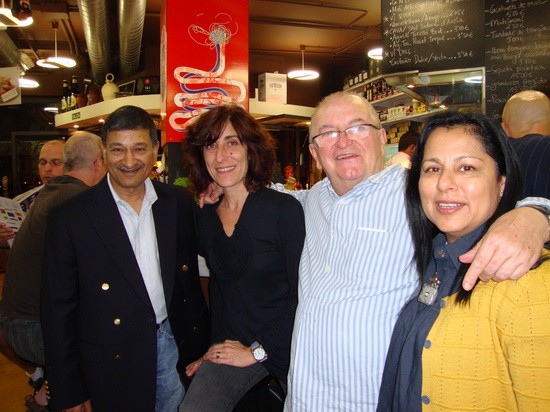
Every Monday, Clay Oven Irvine executive chef/owner Geeta Bansal
shares an interview that she's done with some of the heavyweights of
European cooking. Today, she regales us with a visit with Juan Mari Arzak, the renowned Basque chef. Enjoy!
]
The Father of Modern Spanish Cuisine: Chef Juan Mari Arzak
By Geeta Bansal, Executive Chef-Owner at Clay Oven Irvine
It was with quite a bit of trepidation that I requested chef Arzak if I could ask him questions about his work and life. I have to say that despite my extreme regard and respect for him, I am a little intimidated by him. Then I remembered the jovial side of him, especially around pinxtos (tapas) and Jamon Iberico. One of my most cherished memories is enjoying tapas with Chef Arzak, Isabelle Ferran Adria and my husband Praveen and having that memory saved forever by a photograph that Albert Adria took of all of us. On my last visit to San Sebastian I showed him that picture and he said “Wow!” The next day he said let me see that again and another “Wow!” He is known to play practical jokes on people, and then it became a joke between us. He did say that he has the heart of a child despite his 73 years on the planet.
Chef Arzak is a very well-liked and respected chef and personality in Spain and is credited with being the instigator of the New Basque cuisine. In Donostia, San Sebastian he is treated as the uncrowned king of cuisine as well as the town. His story is fascinating and his journey from humble beginnings to the Chef receiving a Lifetime Achievement Award at the Restaurant Magazine 2012 ceremony is an inspiration in itself.
His restaurant Arzak has been on the culinary landscape of San Sebastian for over a hundred years. His grandparents opened a tavern in the village of Alza in 1897, which is now part of the town of San Sebastian. According to the locals in this part of the Basque country (Alto de Miracruz), the wine served in their tavern was of poor quality and the locals, with their typical sarcastic Basque sense of humor, called it the Alto de Vinagres (House of Vinegar).
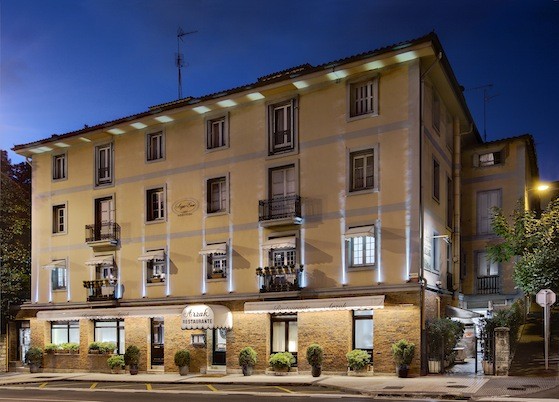
In 1942, Ramon Arzak and Francisca Arratibel (his parents) took it over and turned the tavern into a more refined establishment. With Paquita Arratibel (a renowned Basque female chef) in the kitchen, they served simple local dishes based on the plentiful seafood bounty of the area. The cuisine was centered on eels, hake, and squid from the harbor in various forms: batter fried, with parsley sauce, or squid ink to name a few. I mention this because to this day, these Basque traditions have been maintained at Arzak by Chef Arzak and his daughter Elena, despite them both being at the forefront of culinary innovation, with cutting edge techniques and scientific research that is ongoing in their food lab upstairs. There is also an area that holds over a 1500 plus ingredients that they refer to as the Banco de Sabores or the Taste Bank, with spices and ingredients from around the world.
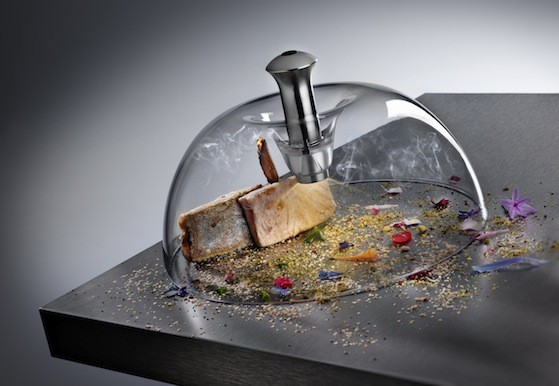
Chef Arzak was born into this environment in 1942 in the restaurant itself where the family lived and worked. He lost his father at the age of nine, and then his mother took over the operation of the family business. At this time the restaurant had a well developed reputation but was far from the elegant fine-dining establishment it is now. At the age of ten, Juan Mari (an only child) went away to El Escorial School in Madrid. When he turned 19 he enrolled in the school of hotel and restaurant management Escuela de Hosteleria de la Casa de Campo in Madrid. He had never planned to become a chef though he had learnt a lot about cuisine from his mother while growing up in the family business. After graduation he wanted to study architecture (many of his plates at Arzak have architectural components), but with encouragement from a friend who was studying gastronomy, he changed his mind. While a culinary school he found his true calling in life and is still pursuing it to this day.
In 1966 he joined the restaurant that his mother Paquita was managing. His mother gave him an area of the diner with a small grill where he started creating contemporary cuisine. Juan Mari started preparing his new plates despite the objections of the locals, who took time to come around. If, according to his mother, his food tasted fine, she was on board with his new cuisine, and he continued his culinary explorations. His wife Maite Espina joined Restaurant Arzak in 1967, and the couple worked together to bring the restaurant standards and style up to where it is now. Their two daughters Marta and Elena were born during this period, and when he was 32 he earned his 1st Michelin star as well the National Gastronomy Award. He was on his way to taste the landscape of Spanish cuisine forever.
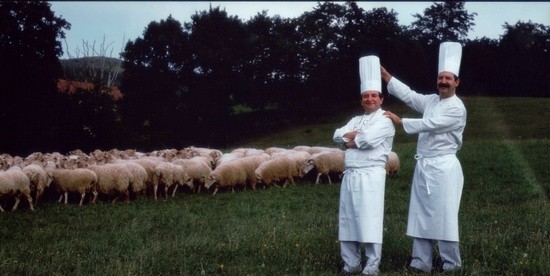
A new era in the gastronomy of the Basque region called the New Basque Cuisine was initiated by a Round Table on Gastronomy in 1976, where a speech by French chef Paul Bocuse gave a new direction to Chef Arzak and his long time friend Pedro Subijana (of the acclaimed Akkelare restaurant in San Sebastian). The two friends packed their bags and took off for Lyon, France, to learn from the master of nouvelle cuisine. During this time Juan Mari created lifelong relationships and friendships with chefs who later became household names around the world. They kept meeting at subsequent round tables and cooking together. I can only imagine the conversations and the work of these present day gods of cuisine. Joel Robuchon, Alain Ducasse, Ramon Olivera, Juan Mari Arzak, Pedro Subijana (here is the perfect story for a movie!) discussing the future of gastronomy.
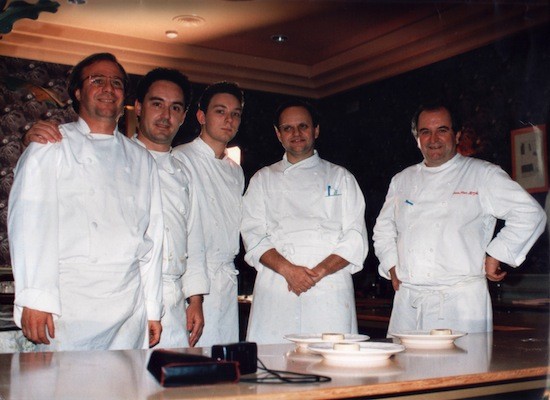
This led to the creation of monthly dinners at restaurants that were part of this movement to be prepared as a team with all those involved in this Round Table on Gastronomy II. Chef Arzak was a part of this initiative to transform and energize regional cuisines, which continued until 1989. That year Arzak was awarded its third Michelin star which it has maintained to this day. This 22-year span from 1990 to 2013 has brought Spanish cuisine to the forefront in a movement by Ferran Adria alongside Juan Mari and other notable Spanish chefs.
During this time Arzak Restaurant has thrived and continued its commitment to taking their heritage into the future. Now his daughter Elena has joined him and they have worked as a team for the last 12 years. Elena, with her Best Female Chef award last year, has brought more glory to this century old house of cuisine. There is a close family-like bond between the members of the team at Arzak, with the majority of the staff being female. I find it endearing that Chef Arzak, this patriarch of the Arzak family, has such respect for women and their capabilities. His older daughter Marta works as a Director of Education at the Guggenheim Museum in Bilbao and is also involved with the restaurant in an advisory capacity.
Chef Arzak has been part of the effort to create conferences and events such as the Madrid Fusion, the Gastronomika , BCN Vangaurdia, and the Salon Internacional del Club de Gourmets. He is an important part of the dialogue regarding cuisine at the National and International levels.
This past week Chef Arzak opened a new restaurant (Ametsa) at the Halkin Hotel in London which is under his instruction and guidance. Elena and he, along with five key team members from Arzak, have worked on the concept and organization. In his own words, they work at their operations in a disciplined, educated, and fraternal environment always in close cooperation with other relevant chefs. His daughters are the fourth generation of this historic tradition and gastronomy is in their blood. This house is here to stay!
My questions for Chef Arzak in a mixture of French, English and Spanish.
[
How did you think of leading the Basque cuisine into the modern form of now?
San Sebastian has a special passion for cuisine, many new innovations and gastronomic firsts happened here. In 1975 we started to fight for a more cultural cuisine with a different perspective going towards arousing more emotions. At the first round table of gastronomic discussions, there was Paul Bocuse, Ramon Olivier, Robuchon and other Spanish and European chefs and Paul Bocuse started to talk about a different cultural cuisine. Then Pedro Subijiana and myself came back from there all charged and ready to fight for this move towards a cultural cuisine. The inspiration came from cultural Bocuse and modern Bocuse.

Who was the major gastronomical influence on you before you became a chef?
My mother was the most important person who influenced me greatly. I was born in the Basque country in the restaurant of my mother. I went to hotel school in Madrid and then I realized that this is what I like and I started to focus on gastronomy. My mother taught me to have respect for the produce and the farmers and fishmongers who provided it. This is something I never forget. (When you see him walk around the local market, laughing and joking with the vendors you can feel heir deep affection for this very humble man who is undoubtedly one of them)
Do you think chefs have a social responsibility to lead gastronomy in a certain direction?
Chefs have to mark the different directions of cuisine, we need to investigate and evolve. We have to always think of new things. All chefs must be part of this process. Of course scientific study is there but we are chefs first. We get ideas from these studies and research but then we must arrive at our own conclusions.
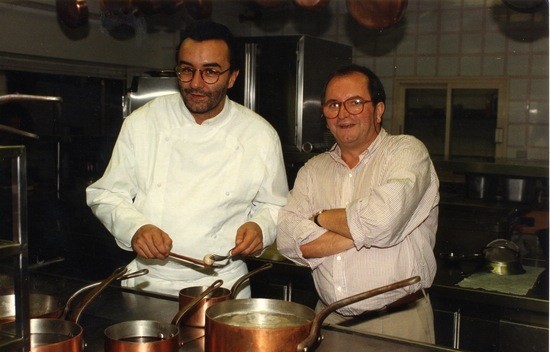
How important is it to preserve your cultural heritage?
Man is how he eats or he eats how he is. The roots of a culture have to be preserved. It is very important and beautiful that a village and a culture have a distinctly different culinary background from another village or culture. It means simply that cultural tradition is like a root, it is beautiful and has to be maintained otherwise everything is global. San Sebastian has a special place in its culture for cuisine which in turn is linked to the city itself.
What prompted you to get involved in initiating the annual Gastronomika in San Sebastian?
I did not do anything alone it was a joint effort. It was to make the cuisine of San Sebastian more well known all over the world and broaden the knowledge of the local people and those who attend the Gastronomika from many different parts of Spain and the world. San Sebastian is the gastronomic capital of Spain so it was natural to have this event here. That is how it started and I was just part of this process along with other chefs here.
What is it about you that though people are in awe of you they all like you a lot?
I thank God that I have become a prophet in my own land. I feel fortunate that people like me and admire me but I do not think much of it. I am proud of my sense of belonging to the people. I have lived here from my childhood and started from zero and made it to where I am now. I have the love of my many friends and peers in this city and feel fortunate. (I would see him holding court at the Joselito tasting area at the Gastronomika every day and marvel at seeing people from all walks of life around him)
Elena said you were emotional for two days when she was named Top Chef last year. Are you a very sentimental person?
Yes I am very emotional and sensitive. I could not stop crying for two days after she was nominated last year. It was a marvelous time for me.
You have a lot of famous chef friends but who do you keep in touch with on a regular basis?
Of course I keep in touch with most of them. I am an extrovert and everywhere I go I can converse and mix with people very easily. I meet chefs everywhere I go and so have plenty of chef friends around the world. Senderens, Bocuse and many more. Bocuse has helped me a lot in my life and I have a special regard for him.

Both your daughters Marta and Elena have made you proud. Apart from being a chef, how do you feel as a parent?
I am a very happy father and very proud of both my daughters. It makes me happy to see them do well. One of them Marta is a director at Guggenheim museum in Bilbao and Elena is with me. (Marta who is an art historian has shared all these rare pictures from their archives)
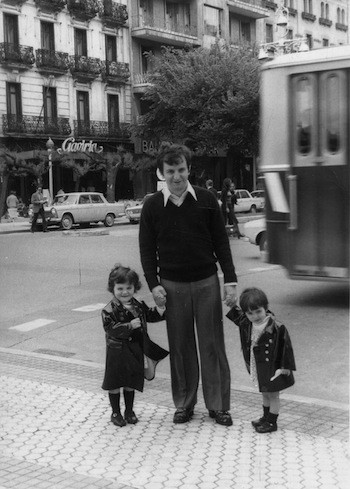
After the opening of Ametsa in London on which you have provided the instruction, are there any more projects you are working on?
For the moment we want to give all our attention to the two restaurants we are consulting on: Ametsa in London and Sando in Madrid. We want to root and settle them and then we will look to other projects if we are called upon to do that.
You have always lived in the Basque area but what other Spanish cities or areas do you like to visit?
All of Spain. Spain is a mosaic of cultures. One region is completely different from another. The food in each region is completely different from that in another region. I go often to Barcelona. You know that Ferran is almost a brother to me and I go to meet him frequently.
What is your philosophy about food?
It is important to have a balance in cooking and food. Food is multi-sensorial and I believe it should involve all the senses. Product is very important as well.
What is your favorite ingredient to cook with?
For me an egg is the best thing. You have had that at Arzak. (Like I would ever forget any meal at Arzak)
Are you constantly seeking new ideas and creating new plates?
I am always looking for new ideas. I work with the different departments at Arzak such as the lab where we are constantly experimenting with flavors and techniques. A lot of research is going on everyday and helps us come up with new plates.
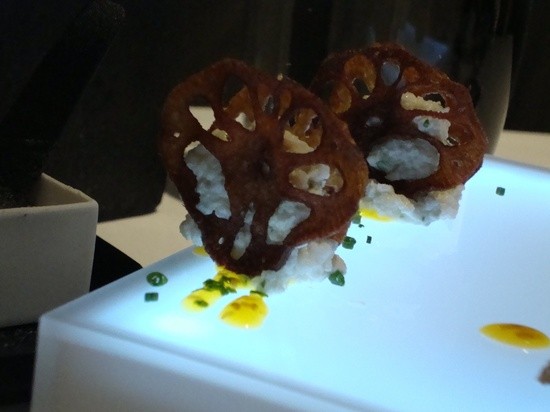
What is your main source of inspiration?
I walk in the world with the eyes of a child and everything inspires me, even the traffic light. The colors of the light can appear on a plate. (I told him that his book that was a gift from Elena on a birthday inspires me a lot and I get ideas from it, especially for my Spanish events.)
What are some of your favorite foods that you enjoy frequently?
I love pinxtos, eggs, and cocochas (the gelatinous part under the jaw or beard of cod and hake) not the cheeks as is usually translated in English. (I asked him to tell me the story that Elena tells of a time when while at a dinner, Chef Arzak, while pointing to the cococha on his friends plate and telling him it was the best part, he picked it up with his fork and popped it into his own mouth to the embarrassment of his family.)
You have young grandchildren–what do they request that you cook for them most?
Yes, the children ask me to cook for them. The kids like mushrooms and corn. And you know Nora (Elena Arzak's 8 year old daughter) likes lamb very much.
How do you take a break from your busy schedule?
I like to look at the sea. I sit by the sea and clear my mind.
Where did you go on your last vacation, not to attend a food event but to relax?
I was in Cancun, Mexico last November and I did nothing but relax.
You had consulted on a restaurant there a while ago?
It was named Tesca and there we had tried to do our own cuisine, it was a more personal consulting. In London we are not presenting our food we are working with local products with our own spirit.
Which other cuisine besides your own do you enjoy eating?
Vietnamese food is one of my favorites. I like the fish and the pasta with rice (rice noodles). They work with a lot of herbs which I like.
What about sushi?
I love sushi very much and you know I have been to Japan many times. Jiro is one of my favorites (we spoke about how much Joan Roca loves chef Jiro's food as well as other chefs such as Pierre Gagnaire)
You work in tandem with Elena. Any plans to retire or slow down?
Slow down! No way! This chefs table where I am sitting is where I will finish my days. As of now I have no plans to retire.
I saw how much energy you had at the Gastronomika and so I can believe that. Do you live near the restaurant?
I live very close to the restaurant about five minutes walk away and you know I was born in the restaurant itself. In those days we lived there itself so it is very convenient for me to come to work. Thank you for educating people about the Basque country and it's cuisine. I will look forward to seeing you at the Gastronomika again this year.
So will I, chef Arzak.


One Reply to “Geeta Bansal Interviews Juan Mari Arzak, the Father of Spanish Cuisine!”